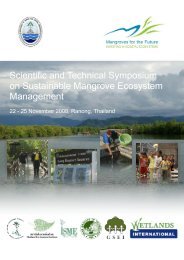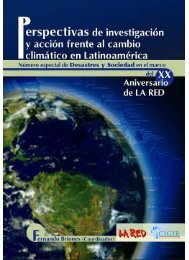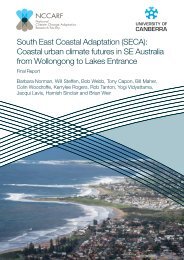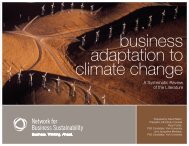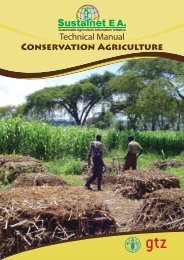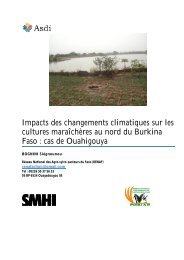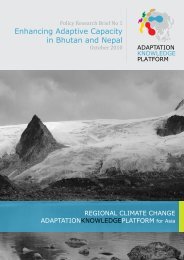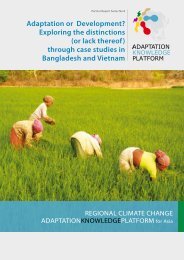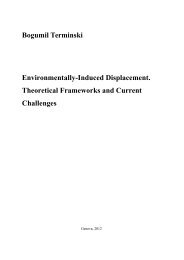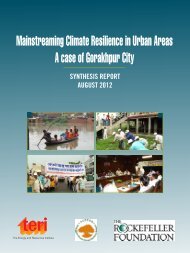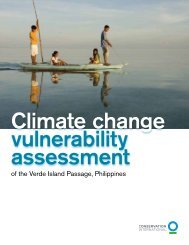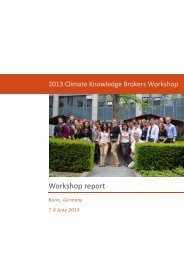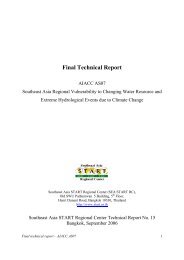generations this history has been forgotten by many city dwellers. Although there areclear signs of a resurgence of interest in local <strong>food</strong> growing, there remains a degree ofantipathy to its expansion in some quarters.Associated with this antipathy but also with important concerns about the public healthaspects of <strong>urban</strong> <strong>food</strong> production, there is a regulatory regime that in many Australiancities that does little to encourage <strong>urban</strong> agriculture. Even though such discouragementmay not have been the original intent of such regimes, they can in practice work thisway. More general attempts to de-regulate may be beneficial but these are more likelyto be effective if carried out as part of broader programs to promote greater <strong>food</strong><strong>security</strong>. This third area holds some potential as there is a growing number of citiesaround the world that are developing systematic <strong>and</strong> strategic <strong>food</strong> <strong>security</strong> programs,most of which include the promotion of <strong>urban</strong> agriculture in their repertoire of policymeasures.4.2 Results from case study fieldworkThe themes used to structure the literature review were explored in more detail in twocase study locations, Melbourne <strong>and</strong> the Gold Coast. Drawing primarily on data frominterviews with a range of local key informants, this section draws also on relevantpolicy documents relating to each area.4.2.1 What do we mean by <strong>food</strong> <strong>security</strong>?The research undertaken for these case studies has revealed that the divergingperceptions of <strong>food</strong> <strong>security</strong> are very noticeable in Melbourne <strong>and</strong> the Gold Coast. Theprevailing view at the national <strong>and</strong> state government levels appears to be that Australiais <strong>food</strong> secure because it exports a substantial surplus (roughly two-thirds) of itsagricultural production. From this perspective, the challenge of global <strong>food</strong> <strong>security</strong> isreframed as an opportunity for Australian agri-business <strong>and</strong> manufacturing sectors, tobecome, as the Prime Minister put it recently, the ‘<strong>food</strong> bowl of Asia’. This view wasechoed by the Victorian Government’s Minister for Agriculture <strong>and</strong> Food Security, PeterWalsh, who in May 2012 called on the state’s farmers to double <strong>food</strong> production by2030 in order to meet ‘growing global dem<strong>and</strong> for <strong>food</strong> <strong>and</strong> fibre’. Similarly, the FederalMinister for Trade <strong>and</strong> Competitiveness, The Hon Dr Craig Emerson, argued recentlyat a conference on the future of Australian’s mid-sized cities, that their future lay inbeing part of a greatly exp<strong>and</strong>ing agriculture <strong>and</strong> <strong>food</strong> processing industry that wouldmeet the growing dem<strong>and</strong>s of the Indian <strong>and</strong> Chinese middle classes. In this framing,domestic <strong>food</strong> <strong>security</strong> – at the regional, state <strong>and</strong> national level, is simply taken forgranted, irrespective of <strong>climate</strong> <strong>change</strong> <strong>and</strong> any other challenges such as Peak Oil orglobal economic turbulence. This view is clear also in the recently published AustralianGovernment Green Paper, Towards a National Food Plan for Australia (AustralianGovernment, 2012).This attitude of complacency regarding domestic <strong>food</strong> <strong>security</strong> appears to include,within parts of both the Victorian <strong>and</strong> Queensl<strong>and</strong> governments, open contempt forideas <strong>and</strong> practices associated with ‘local’ <strong>food</strong>, including <strong>urban</strong> agriculture. This wasmade clear to the research team by individuals with detailed knowledge of recent<strong>change</strong>s in the Victorian Department of Primary Industries (DPI):<strong>Urban</strong> <strong>food</strong> <strong>security</strong>, <strong>urban</strong> <strong>resilience</strong> <strong>and</strong> <strong>climate</strong> <strong>change</strong> 31
[There] is a growing group of traditional economists sitting within the researcharms of DPI, orthodox, economic rationalists. They have a lot of power [<strong>and</strong>] havebeen responsible for poo-poohing concepts like <strong>food</strong> miles, or small farms versusbig farms … They’ve no interest in <strong>urban</strong> agriculture, <strong>and</strong> are going out of theirway to actively disparage it. Any <strong>food</strong> growing that’s not large-scale, commercialproduction oriented to export, is [for them] largely a waste of time.For them, the unit of analysis is a farm; <strong>and</strong> they have to define in some way what theaverage size of a farm is, <strong>and</strong> they extrapolate up to the state level.You can draw the consequences of such an approach, from an environmental[<strong>and</strong> <strong>climate</strong> <strong>change</strong>] perspective. It’s a very biased <strong>and</strong> partial analysis. Thatnotion of extrapolating from farm up to state level is the most problematic for[work] in the <strong>climate</strong> <strong>change</strong> space, [where the focus] is on [bio-]regional issues.[state government scientist]This attitude of open hostility by senior DPI staff towards individuals <strong>and</strong> organisationsworking for what might be termed a ‘sustainable <strong>and</strong> resilient’ <strong>food</strong> system based onsupport for <strong>urban</strong> <strong>and</strong> peri-<strong>urban</strong> agriculture was also mentioned by other VictorianState Government employees with whom we spoke.Conversely, <strong>and</strong> as mentioned above, the semi-autonomous state government agencyVicHealth has been a prime institutional driver for mainstreaming <strong>food</strong> <strong>security</strong> at thepolicy <strong>and</strong> project level at local government. VicHealth made a major strategicintervention in this field with the launch in 2005 of a five-year, multi-million dollar projectentitled Food for All. In the design of that project, VicHealth deliberately chose to adoptthe FAO’s definition of <strong>food</strong> <strong>security</strong>, with the added element that individuals should nothave to depend on emergency <strong>food</strong> sources in order to gain access to adequateamounts of <strong>food</strong>. As one of the managers associated with the Food for All project toldus:From the VicHealth perspective, <strong>food</strong> <strong>security</strong> is more about inclusiveness, socialconnectedness. The underst<strong>and</strong>ing is of having secure access for all to adequateamounts of culturally appropriate <strong>and</strong> safe <strong>food</strong>, <strong>and</strong> not from emergency sources.Regular <strong>food</strong> to stay well, good quality <strong>food</strong>, from regular sources, not from <strong>food</strong>banks <strong>and</strong> soup kitchens. [Former manager, VicHealth]Nine local governments were funded to recruit <strong>food</strong> <strong>security</strong> officers as part of the fiveyear,Food for All project. One of the explicit objectives of that project was to achieveintegrated planning within councils <strong>and</strong> across their various departments; <strong>and</strong> it wasenvisaged that a first step towards that goal was to integrate <strong>food</strong> <strong>security</strong> into localgovernment policy documents. A positive outcome of the project was that theparticipating councils all incorporated, most for the first time, <strong>food</strong> <strong>security</strong> into theirmost recent (2009–2013) Municipal Public Health Plans (which some Councils alsonow describe as Municipal Public Health <strong>and</strong> Well-being Plans). The project evaluationalso reported that the most recent plans reflected:<strong>and</strong>;a shift from healthy eating <strong>and</strong> nutrition in the earlier plans to <strong>food</strong> access, <strong>food</strong>affordability <strong>and</strong> <strong>food</strong> <strong>security</strong> in the later plans;<strong>Urban</strong> <strong>food</strong> <strong>security</strong>, <strong>urban</strong> <strong>resilience</strong> <strong>and</strong> <strong>climate</strong> <strong>change</strong> 32
- Page 1 and 2: Synthesis and Integrative ResearchF
- Page 3 and 4: Published by the National Climate C
- Page 5 and 6: ABSTRACTFood security is increasing
- Page 7 and 8: 1. a review of the literature: on n
- Page 9 and 10: its Food for All project. This help
- Page 13 and 14: In response to the existential thre
- Page 15 and 16: 2. OBJECTIVES OF THE RESEARCHFood i
- Page 17 and 18: debates and to the more systematic
- Page 19 and 20: organisation in the past few years.
- Page 21 and 22: 4. RESULTSIn this section we presen
- Page 23 and 24: increasing productivity. Thus, whil
- Page 25 and 26: people and the origins of their foo
- Page 27 and 28: urban food supply chains. Thus, whi
- Page 29 and 30: This logistics system is dominated
- Page 31 and 32: Like Hodgson et al., as per definit
- Page 33 and 34: esilient, powerful by being locally
- Page 35 and 36: volume or even its contribution to
- Page 37: community food growing can have on
- Page 42 and 43: a stronger focus on addressing the
- Page 44 and 45: The third key aspect is fairness -
- Page 46 and 47: climate (which we live and work in
- Page 48 and 49: agriculture. Eight percent is in ur
- Page 50 and 51: This concept of the ‘spaces in be
- Page 52 and 53: esearch scientist and chair of the
- Page 54 and 55: As discussed above, protection of t
- Page 56: 4.2.5 What is the extent and the im
- Page 60 and 61: no place under the panoply of pract
- Page 62 and 63: increased, the market dominance of
- Page 64 and 65: … the residents of S Park called
- Page 66 and 67: 5. CONCLUSIONSThere is growing conc
- Page 68 and 69: urban resilience. This inevitably c
- Page 70 and 71: In many respects these contrasting
- Page 72 and 73: Many interviewees of both standpoin
- Page 74 and 75: a given area. The rationale for thi
- Page 76 and 77: mapping the location of sources of
- Page 78 and 79: Australian food policy debates refl
- Page 80 and 81: APPENDIX 1: URBAN FOOD SECURITY, UR
- Page 82 and 83: IntroductionGlobally, and in Austra
- Page 84 and 85: Review methodsThis stage of the res
- Page 86 and 87: despite many of the causes of food
- Page 88 and 89: …by 2050… food production will
- Page 90 and 91:
2. How is food security (in general
- Page 92 and 93:
the food security of cities, but no
- Page 94 and 95:
While some see the density of devel
- Page 96 and 97:
when suppliers, distributors, and c
- Page 98 and 99:
a more prominent role in enhancing
- Page 100 and 101:
community gardens webpage on the Co
- Page 102 and 103:
comprehensive description of the ca
- Page 104 and 105:
In both the developed and developin
- Page 106 and 107:
Their review notes a significant in
- Page 108 and 109:
lines of supply from often rural pl
- Page 110 and 111:
1 IntroductionCities have always be
- Page 112 and 113:
Despite some attempts to curb urban
- Page 114 and 115:
the Gold Coast remains a city that
- Page 116 and 117:
ackyard/community gardenernot affil
- Page 118 and 119:
level in local government. VicHealt
- Page 120:
Figure 2: Impacts on Municipal Food
- Page 125 and 126:
security I recognise that the cost
- Page 127 and 128:
United States, he offered the follo
- Page 129 and 130:
This vision highlights the multi-fu
- Page 131 and 132:
An environmental education centre.
- Page 133 and 134:
Melbourne Food ForestA Melbourne ga
- Page 135 and 136:
stakeholder consultations, the repo
- Page 137 and 138:
can. We sense the changes. The earl
- Page 139 and 140:
half-desert environments. We’re g
- Page 141 and 142:
etain its basic function and struct
- Page 143 and 144:
government; and that trying to get
- Page 145 and 146:
the north and the west, where it wo
- Page 147 and 148:
Why do people buy so much food that
- Page 149 and 150:
urban agriculture (however broadly
- Page 151 and 152:
enefits and risks. Before we can co
- Page 153 and 154:
Another important and tangible role
- Page 155 and 156:
coast without any problems whatsoev
- Page 157 and 158:
BIBLIOGRAPHYAECOM (2011) Scoping St
- Page 159 and 160:
Burns, C. I., A. (2007). Measuring
- Page 161 and 162:
Edwards, F., & Mercer, D. (2010). M
- Page 163 and 164:
James, S. O’Neill, P. and Dimeski
- Page 165 and 166:
Millar, R., 2012, ‘Government shi
- Page 167 and 168:
Saltmarsh, N. M., J; Longhurst, N.
- Page 169 and 170:
Walker B., 2008, Resilience Thinkin



